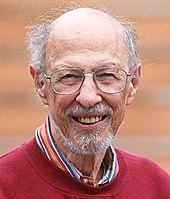Fernando José Corbató
Fernando José "Corby" Corbató (born July 1, 1926 in Oakland , California ; † July 12, 2019 in Newburyport , Massachusetts ) was an American computer scientist who is particularly considered a pioneer for his development of operating systems with time-sharing . In addition to many other awards, he received the Turing Award in 1990 for his work on the organization of the concepts and the management of the development of generally and on a large scale applicable, time and resource-saving computer systems.
life and work
Fernando Corbató made his bachelor's degree after studying at the California Institute of Technology (Caltech) in 1950. In 1956, he received a doctorate in physics from the Massachusetts Institute of Technology (MIT). Immediately afterwards, he started at MIT's data center, was appointed professor there in 1965 and stayed until his retirement . He was married and had two daughters.
The first time sharing procedure in which he was involved was MIT's Compatible Time-Sharing System , an early version of which was introduced in 1961. The experience flowed into another project called Multics and developed by Honeywell International . Even if Multics was not very successful commercially, it inspired Ken Thompson to develop the Unix operating system, of which many further developments are still used today. It also became a model for many of the following operating systems.
Corbató's rule has also become known :
- The number of lines of program code that a programmer can write in a given period of time is always the same, regardless of the language used.
In 1966 he received the first W. Wallace McDowell Award . In 1975 he was elected to the American Academy of Arts and Sciences .
Works (selection)
- FJ Corbató, MM Daggett, RC Daley: An Experimental Time-Sharing System (IFIPS 1962)
- FJ Corbató (Ed.): The Compatible Time-Sharing System: A Programmer's Guide (MIT Press, 1963)
- FJ Corbató, VA Vyssotsky : Introduction and Overview of the Multics System ( AFIPS 1965)
- FJ Corbató: PL / I As a Tool for System Programming ( Datamation , May 6 1969)
- FJ Corbató, CT Clingen, JH Saltzer: Multics - The First Seven Years (AFIPS, 1972)
- FJ Corbató, CT Clingen: A Managerial View of the Multics System Development (Conference on Research Directions in Software Technology, Providence, Rhode Island, 1977)
- FJ Corbató: On Building Systems That Will Fail (Turing Award Lecture, 1991)
Web links
- Biography at MIT (English)
- Oral history interview by Arthur L. Norberg at the Charles Babbage Institute (English)
- Videos by and about Fernando José Corbató in the AV portal of the Technical Information Library
Individual evidence
- ↑ Katie Hafner: Fernando Corbató, a Father of Your Computer (and Your Password), Dies at 93. In: The New York Times , July 12, 2019 (English). Retrieved July 13, 2019.
| personal data | |
|---|---|
| SURNAME | Corbató, Fernando José |
| ALTERNATIVE NAMES | Corbató, Corby (nickname) |
| BRIEF DESCRIPTION | American computer scientist |
| DATE OF BIRTH | July 1, 1926 |
| PLACE OF BIRTH | Oakland , California |
| DATE OF DEATH | 12th July 2019 |
| Place of death | Newburyport , Massachusetts |
